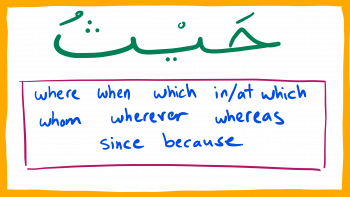حَيْثُ Haithu and its Multiple Meanings Posted by yasmine on Mar 20, 2019 in Arabic Language, Vocabulary
When learning a new language, the little words sometimes tend to be the hardest to remember especially if they have multiple meanings معاني متعددة. In this post we’ll look at a three-letter word that you are bound to find in texts and hear on the news in various contexts.
حَيْثُ is an adverb that can mean (where, when, which, in which, at which, , whom, wherever, whereas, since and because)
We’ll be begin with the most common meaning for حَيْثُ being “where” not as a question, but as in the place or situation in which something occurs. Here’s an example:
where
.وزار أيضا القدس حيث التقى جده لأول مرة
He also visited Jerusalem, where he met his grandfather for the first time.
Here are more examples of how حَيْثُ is used.
when
.حيث انتقلتُ الى هذه المدينة، كنتُ مكتئباً نوعاً ما
When I first moved to this city, I was kind of depressed.
which
.تقنية حيث يمكن بها مساعدة كل الناس
A technology which will help all people.
in which
.دعني اريك الموقع حيث سنقوم ببناء البيت الجديد
Let me show you the location in which we would build the new house.
at which
.وشاركت مؤخرا في مناسبة، حيث ألقت محاضرة
She had recently attended an event, at which she gave a lecture.
whom
.هناك فرص عمل قليلة متاحة لخريجي الجامعات، حيث ينصرف العديد منهم للخارج ليبحثوا على عمل
There is a lack of employment opportunities available to graduates, many of whom leave the country to find work.
wherever
.بعد هذا، سترجع إلى حيث ما جاءت
After this, she’ll go back to wherever she came from.
whereas
.أنا أعمل طول الأسبوع، حيث أن أخي يعمل فقط يومين
I work all week, whereas my brother only works two days.
since:
.كان يكره العمل بالمزرعة حيث أنه كان شاقا جداً
He hated the farm work since it was very hard.
because
.لا يمكنك المتابعة حيث تم دخولك على كمبيوتر آخر
You cannot continue because you are already logged in on another computer.
In the coming posts, we’ll look at other little words such as قد ,ف ,إن ,أن and how they are used. 🙂

Build vocabulary, practice pronunciation, and more with Transparent Language Online. Available anytime, anywhere, on any device.





Comments:
BAMBANG SPRIANTO:
شكرا جزيلا , Yaa Ustajah Yasmine, i found your post is very useful and resourceful.
looking forward to your next writings. I am from Indonesia. I am crazy about Arabic. Please write more and share more of your knowledge of Arabic .جزاك الله خير
Masood:
Hi, Thanks for your post. It is really useful. I would request you if you could include example from the holy Quran that would be greatly appreciated. It will help those who are learning Arabic to understand the holy Quran.
Thanks
yasmine:
@Masood Great suggestion, will do! 🙂
شكراً
سلام
ياسمين
Lish:
Thank you very much for writing a special article to explain my questions??.This is very helpful.Your explanation is very clear and easy to understand. After all this time I was stuck with this word,finally now, I know how to use word “حيث” and this is because of you Yasmin?. I can’t wait to read your another articles.
Lish:
السلام عليكم
Thank you very much for writing a special article to explain my questions??.This is very helpful.Your explanation is very clear and easy to understand.
After all this time I was stuck with this word,finally now, I know how to use word “حيث” and this is because of you Yasmine?. I can’t wait to read your another articles?
شكرا جزيلا
yasmine:
@Lish 😀 !ممتاااااز
So glad you found this useful!
This week I’ll explain the other words you requested. 🙂
شكراً
سلام
ياسمين